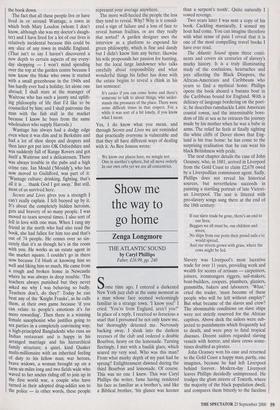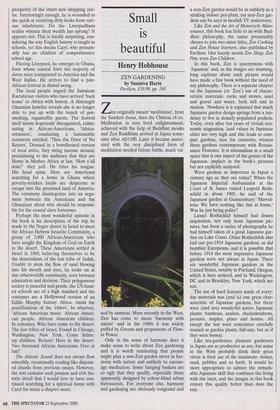Show me the way to go home
Zenga Longmore
THE ATLANTIC SOUND by Caryl Phillips Faber, £16.99, pp. 240 Some time ago, I entered a darkened New York jazz club at the same moment as a man whose face seemed welcomingly familiar in a strange town. 'I know you!' I cried. 'You're from England, aren't you?' In place of a reply, I received so ferocious a snarl that I presumed he not only knew me, but thoroughly detested me. Nervously backing away, I slunk into the darkest recesses of the club and ordered a double Bourbon, heavy on the lemonade. Turning fleetingly, I met with a basilik glare, which seared my very soul. Who was this man? From what murky depth of my past had he sprung? Enlightenment dawned during the third Bourbon and lemonade. Of course. This was no one I knew. This was Caryl Phillips the writer, fame having rendered his face as familiar as a brother's, and like a Biblical brother, 'his glance was keener than a serpent's tooth'. Quite naturally I vowed revenge.
Two years later I was sent a copy of his book. Cackling maniacally, I sensed my hour had come. You can imagine therefore with what sense of pain I reveal that it is one of the most compelling travel books I have ever read.
The Atlantic Sound spans three conti- nents and covers six centuries of slavery's murky history. It is a truly illuminating study of the confusions, heartaches and joys affecting the Black Diaspora, the African-Americans and Caribbeans who yearn to find a mythical home. Phillips opens the book aboard a banana boat in the Caribbean bound for England. With a delicacy of language bordering on the poet- ic, he describes ramshackle Latin American coastal towns, and the interminable bore- dom of life at sea as he retraces the journey made by his mother when he was a babe in arms. The relief he feels at finally sighting the white cliffs of Dover shows that Eng- land is his true home: he has come to the surprising realisation that he can wear his black Britishness with pride.
The next chapter details the case of John Ocansey, who, in 1881, arrived in Liverpool from the Gold Coast to claim £2,678 owed by a Liverpudlian commission agent. Sadly, Phillips does not reveal his historical sources, but nevertheless succeeds in painting a startling portrait of late Victori- an Liverpool. The text is littered with pro-slavery songs sung there at the end of the 18th century:
If our slave trade be gone, there's an end to our lives,
Beggars we all must be, our children and wives;
No ships from our ports their proud sails e'er would spread, And our streets grown with grass, where the cows might be fed.
Slavery was Liverpool's most lucrative trade for over 11 years, providing work and wealth for scores of artisans — carpenters, joiners, ironmongers riggers, sail-makers, boat-builders, coopers, plumbers, glaziers, gunsmiths, bakers and labourers. 'What,' cried the trader, 'must become of these people who will be left without employ?' But what became of the slaves and crew? The abominable conditions on slave ships were not strictly reserved for the African captives. Above deck the sailors were sub- jected to punishments which frequently led to death, and were prey to fatal tropical diseases. Decent sailors regarded slaving vessels with horror, and slave crews some- times doubled as pirates.
John Ocansey won his case and returned to the Gold Coast a happy man, partly, one imagines, because he had left Liverpool behind forever. Modern-day Liverpool leaves Phillips decidedly unimpressed. He trudges the glum streets of Toxteth, where the majority of the black population dwell, and compares them bitterly to the faceless prosperity of the smart new shopping cen- tre. Interestingly enough, he is wounded to the quick at receiving dirty looks from vari- ous inhabitants. Do the Liverpudlians realise whence their wealth has sprung? It appears not. This is hardly surprising, con- sidering the way English history is taught in schools, yet this shocks Caryl, who presum- ably has no children of comprehensive school age.
Fleeing Liverpool, he emerges in Ghana, from whose coastal forts the majority of slaves were transported to America and the West Indies. He arrives to find a pan- African festival in dismal swing.
The local people regard the Jamaican Rastafarian visitors who have arrived 'back home' to Africa with horror. A distraught Ghanaian hotelier reveals she is no longer able to put up with the bunch of pot- smoking, ragamuffin guests. The festival itself seems hopelessly disorganised, culmi- nating in African-Americans, 'Africa- returnees', conducting a lamentable ceremony entitled: `Thru the Door of No Return'. Dressed in a bowdlerised version of local attire, they swing incense around, proclaiming to the audience that they are Home in Mother Africa at last. 'How y'a11 doin?' they yell. He bites his tongue. His head spins. Here are Americans searching for a home in Ghana where poverty-stricken locals are desperate to escape into the promised land of America. The ceremony disintegrates into an argu- ment between the Americans and the Ghanaians about who should be responsi- ble for the coastal slave fortresses.
Perhaps the most wonderful episode in the book is his description of the trip he made to the Negev desert in Israel to meet the African Hebrew Israelite Community, a group of 2,000 African-Americans who have sought the Kingdom of God on Earth in the desert. These Americans settled in Israel in 1969, believing themselves to be the descendants of the lost tribe of Judah. Unable to stem the flow of sand blowing into his mouth and eyes, he looks on at this otherworldly community, torn between admiration and derision. Their polygamous society is peaceful and gentle, the US-fund- ed schools are of a high standard and the costumes are a Hollywood version of an Eddie Murphy fantasy Africa. Amid the pontifications of the 'elders', he observes, `African American music. African Ameri- can people. African American children. In costumes. Who have come to the desert. The lost tribes of Israel. Found in Chicago, Washington, New York. Come hither, my children. Return! Here in the desert. Two thousand African Americans. Free at last!'
The Atlantic Sound does not always flow smoothly, occasionally reading like disjoint- ed chunks from previous essays. However, the text contains such passion and rich his- toric detail that I would love to have con- tinued searching for a spiritual home with Caryl for many a chapter more.























































































 Previous page
Previous page